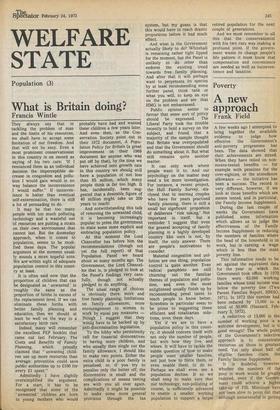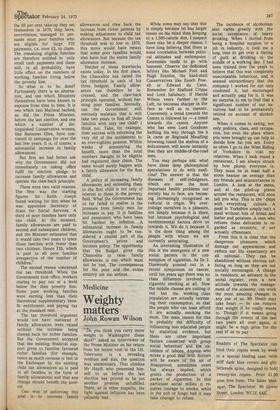Poverty
A new approach
Frank Field
A few weeks ago I attempted to bring together the available evidence to judge how effective the Government's anti-poverty programme has been. The data showed that their achievements are mixed. When they have relied on nonmeans-tested benefits — for example with pensions for the over-eighties, or the attendance allowance — the initiative has been a success. The record is very different, however, if we look at those benefits which are means tested, and in particular, the Family Income Supplement.
During the last couple of weeks the Government have published some information which allows us to judge the effectiveness of the Family Income Supplement in reducing the numbers of families where the head of the household is in work, but is earning a wage which is less than the state poverty line.
This information needs to be set against the equivalent data for the year in which the Government took office. In 1970. there were 63,000 working families whose total income was below the poverty line (Two Parent Families Report, HMSO, 1971). In 1972 this number had been reduced by 13,000 to a total of 50,000 (Hansard, February 5, 1972).
A reduction of 13,000 in the number of working poor is a welcome development, but is it good enough? The whole point of the Government's selective approach is to concentrate resources on those in greatest need. Yet only about half of eligible families claim the Family Income Supplement.
It is doubtful, however, whether the numbers of the poor in work would be greatly reduced, even if the Government could achieve a highet take-up of FIS. Ministers have not been slow to point out that although unsuccessful in gettinf the 85 per cent take-up they set themselves in 1970, they have, nevertheless, managed to persuade most poor families who are eligible for large FIS payments, i.e. over £2, to claim. The remaining eligible families are therefore entitled to only small cash payments and these will, in all probability, have little effect on the numbers of working families living below the poverty line.
So what is to be done? Fortunately there is an alternative, and one which Ministers themselves have been known to espouse from time to time. It is one which lain Macleod backed, as did the Prime Minister, before the last election, and one which a number of distinguished Conservative women, like Baroness Elles, have continued to campaign for over the last few years. It is, of course, a substantial increase in family allowances.
But first we had better ask why the Government did not immediately on taking office fulfil its election pledge to increase family allowances and operate the claw-back principle.
There were two valid reasons. The first was the starting figures Sir Keith Joseph found waiting for him when he was appointed Secretary of State for Social Services. A third of poor families have only one child. At the moment, family allowances are paid to second and subsequent children, and the Minister estimated that it would take two years to trace those families with fewer than two children. Hence FIS, which is paid to all poor families irrespective of the number of children.* The second reason concerned the tax threshold. When the Government took office, workers started to pay tax at a level below the then poverty line. Some poor working families were earning less than their theoretical supplementary benefit entitlement and paying tax at the standard rate.
The tax threshold argument would not have mattered if family allowances were raised without the increase being clawed back for richer families. But the Government accepted that the existing financial support given to families favoured richer families (for example, twice as much revenue is lost to the Exchequer by the existing child tax allowances as is paid to all families in the form of family allowances) and that any change should benefit the poorest. allowances and claw back the increase from richer parents by making adjustment to child tax allowances. But because the tax threshold was so low in 1970, this move would have meant that some poor families would. also have lost the entire family allowance increase.
Neither of these drawbacks exists today. In the first place, the Chancellor •has raised the tax threshold in each of his three budgets. Family allowances can therefore be increased, and the claw-back principle operated, without harming poor families. Secondly, can the Government still seriously maintain that it will take two years to find all those families with only one child? I think not. Take, for example, their success with informing the very old of the entitlement to an over-eighties pension. Within weeks of announcing the benefit, more than the total numbers thought to be eligible had registered their claim. The same would surely happen with a family allowance for the first child.
A policy of increasing family allowances and extending them to the first child is not only of interest to those in the poverty field. What the Government has so far failed to realise is the pressure from family men for increases in pay. It is families and pensioners who have been hit hardest by inflation. A substantial increase in family allowances ought to be considered a crucial part of the Government's prices and incomes policy. The opportunity that the Budget gives the Chancellor to raise family allowances is one which must not be lost. The consequences for the poor and the entire country are too serious.



































 Previous page
Previous page